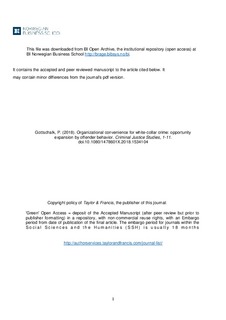Organizational convenience for white-collar crime: Opportunity expansion by offender behavior
Journal article, Peer reviewed
Accepted version
Permanent lenke
http://hdl.handle.net/11250/2571795Utgivelsesdato
2018Metadata
Vis full innførselSamlinger
- Publikasjoner fra CRIStin - BI [1015]
- Scientific articles [2181]
Originalversjon
Criminal Justice Studies. 2018 October 6, 1-11. https://doi.org/10.1080/1478601X.2018.1534104Sammendrag
The theory of convenience suggests that the extent of white-collar crime is dependent on financial motive, organizational opportunity, and willingness for deviant behavior. Organizational opportunity is at the core of convenience theory, where privileged and powerful offenders have legitimate access to resources in their professions to commit and conceal financial crime. This article introduces a dynamic perspective of organizational opportunity where a white-collar offender can cause opportunity expansion over time. Based on agency theory, social disorganization theory, and blame game theory, a case study is presented. The case study is concerned with a chief financial officer (CFO) who applied several opportunity expansion techniques before he conveniently was able to commit and conceal embezzlement in the business where he was employed.
